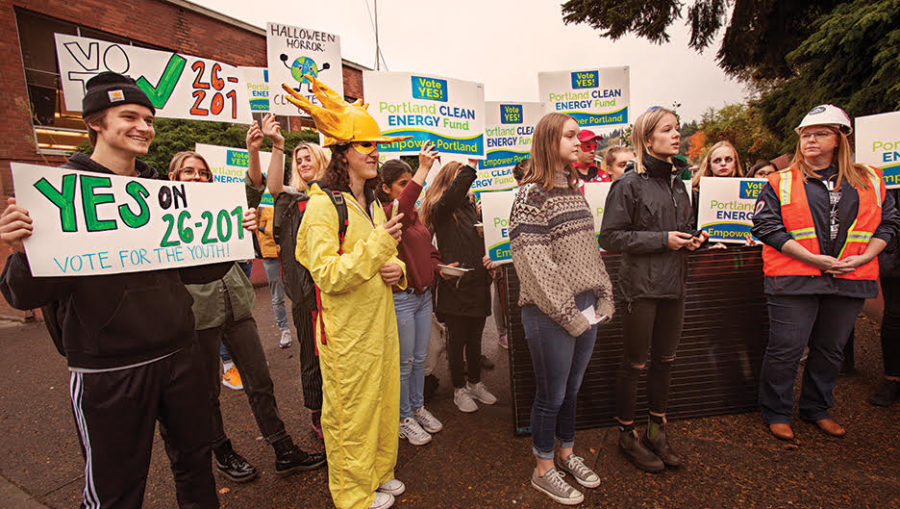Environmental Justice Club takes action
Photo Courtesy of Bella Klosterman
From left to right: Senior Wyatt Jenkerson, senior Carmen Vintro, senior Hailey Fisher, and senior Bella Klosterman at the Environmental Justice Club Oct. 31 rally in support of the Portland Clean Energy Initiative. Klosterman and Vintro started the club this year and have taken leadership positions.
Ice sheets have continued to shrink while political polarity intensifies as the fourth-hottest year on record came to an end. While some may think that the global situation seems dire, and concerned individuals at Lincoln have been busy improving sustainability and reducing their eco-footprint using local activism and nonviolent direct action.
Senior Bella Klosterman is the founder of Lincoln’s Environmental Justice Club (EJC), whose goal is to fight for climate justice for future generations. The club worries that Portland and Oregon citizens feel that they’ve done enough for the environment, when in reality, that’s not the case.
The club is worried that Portland and Oregon citizens feel that they’re doing enough to preserve the environment, when in reality, that’s not the case.
“I think there’s a lot more to the Portland community than people think,” said Klosterman. “A lot of people think that it’s this holy grail of a green city; that’s not entirely true. It results in a lot of complacencies.”
Klosterman founded the EJC at the start of the 2018-19 school year and has shared leadership responsibilities with senior Carmen Vintro.
“I feel like a lot of [our goal] is about raising awareness,” said Vintro. “What happens in the Lincoln community is that there’s a lot of talk but not a lot of action.”
The club works in sync with the Environmental Justice class, taught by social sciences teacher Tim Swinehart. They support reformative climate change legislation, such as Congress’ proposed Green New Deal (a proposed of economic programs that hope to address climate issues). They organized a rally on Oct. 31 outside of Lincoln, garnering over 25 students in support of the Portland Clean Energy Initiative (Measure 26-201), which was passed later that year.
“One thing I’ve seen [at Lincoln] is how much students care about this issue,” said Swinehart.
“This year, actually, [there was] some really great student activism in November to hold a rally here at Lincoln in support of the ballot measure that passed here in Portland called the Portland Clean Energy Initiative.”
“The Portland Clean Energy Initiative (PCEI) means $30 million in new annual revenue for clean energy and clean energy jobs in Portland,” according to the PCEI’s website. “Nonprofit organizations… can apply for grants from this revenue to weatherize homes, install solar and other renewable energy projects, provide job and contractor training, expand local food production and build green infrastructure in Portland.”
The EJC is planning to participate in a global “climate strike” this month along with tens of thousands of students across the world. The club encourages students to walk out on Mar 15 to protest current climate policies and to help citizens better comprehend the current state of the earth’s ecosystem.
The movement has been spearheaded by Swedish climate activist Greta Thunberg. Thunberg, a 16-year-old, made headlines last September by sitting on the Swedish Parliament building steps every day during school for three weeks before Sweden’s general elections.
“It’s not about the little things anymore, unfortunately,” said Vintro. “We need monumental change and this is one of the ways we can raise awareness around that.”
In 2017, the United States announced its decision to withdraw from the Paris Agreement, an international accord to mitigate climate change, due in part to President Trump’s claims that the deal would weaken the US economy and only decrease the earth’s temperature by “two-tenths of one degree.” The decision sparked protests internationally about the future of the earth’s climate.
Many government officials, including several Congressmen and President Trump, have adamantly denied that climate change is real. “I’m not a believer in global warming. And I’m not a believer in man-made global warming,” said President Trump during a radio interview in 2015.
“The hope is that [the climate] will become a litmus test in the 2020 election,” said Vintro, “that [it] will determine how people decide who to vote for.”
The EJC works to challenge authority by questioning people in power and those who are supposed to be protecting the climate.
“We need huge changes, and if every major city comes together and leads these strikes, that’s going to send a message to our national government,” said Vintro.
The Environmental Justice Club meets on Tuesdays in room 147.

